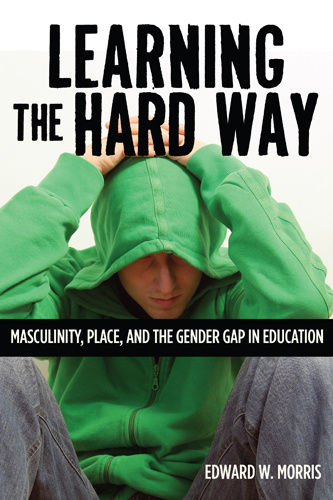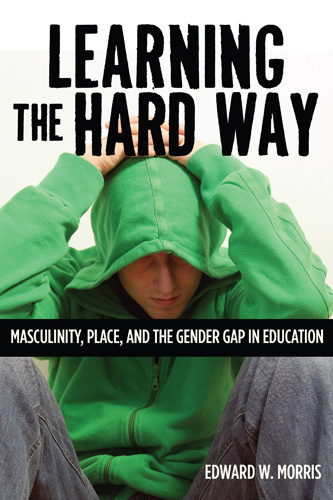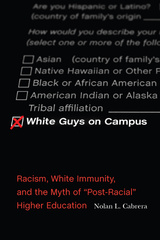Learning the Hard Way
Masculinity, Place, and the Gender Gap in Education
An avalanche of recent newspapers, weekly newsmagazines, scholarly journals, and academic books has helped to spark a heated debate by publishing warnings of a “boy crisis” in which male students at all academic levels have begun falling behind their female peers. In Learning the Hard Way, Edward W. Morris explores and analyzes detailed ethnographic data on this purported gender gap between boys and girls in educational achievement at two low-income high schools—one rural and predominantly white, the other urban and mostly African American. Crucial questions arose from his study of gender at these two schools. Why did boys tend to show less interest in and more defiance toward school? Why did girls significantly outperform boys at both schools? Why did people at the schools still describe boys as especially “smart”?
Morris examines these questions and, in the process, illuminates connections of gender to race, class, and place. This book is not simply about the educational troubles of boys, but the troubled and complex experience of gender in school. It reveals how particular race, class, and geographical experiences shape masculinity and femininity in ways that affect academic performance. His findings add a new perspective to the “gender gap” in achievement.
Differences in school performance related to gender represent one of the more enduring discussions in education and psychology. Explanations have ranged from differences attributed purely to the way young people are socialized, to differences that are fundamentally biological. Based on an ethnographic study of poor students in two schools Morris has synthesized an explanation making economic circumstances, something described as 'place,' a critical element in shaping gender differences. Recommended.
Morris's study offers fresh insights, showing boys' underachievement in schools to be a hidden cost of their insecurities about the shifting foundations of men's power and privilege. Learning the Hard Way points us toward a humane and egalitarian path in schools and society.
In a detailed and compelling analysis Ed Morris helps us understand how masculinity is implicated in the academic under-performance of black males. Morris shows us that what's needed is a whole new way of thinking about and understanding masculinity.
Learning the Hard Way is solid and convincing. Morris shows us working and lower-class boys who are capable of doing good academic work, but who invest their energy and intelligence in sports, fighting, physical labor, or resisting the control regimes of school.
In Learning the Hard Way, Morris convincingly examines masculinity in schooling by unpacking the multiple layers of race, location, class, and gender often overlooked in scholarship.
EDWARD W. MORRIS is an assistant professor of sociology at the University of Kentucky and the author of An Unexpected Minority: White Kids in an Urban School (Rutgers University Press).
1. Introduction
2. Respect and Respectability
3. The Hidden Injuries of Gender
4. Too Cool for School: Masculinity and the Contradictions of Achievement
5. Rednecks and Rutters: Rural Masculinity and Class Anxiety
6. Clownin' and Riffin': Urban Masculinity and the Complexity of Race
7. "Girls Just Care about It More": Femininity and Achievement As Resistance
8. Friday Night Fights
9. Conclusion
Appendix. Research Methods: Process and Representation
Notes
References
Index
















